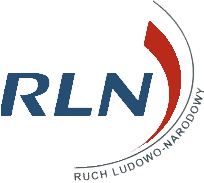The Polish People's Party is an agrarian political party in Poland. It is currently led by Władysław Kosiniak-Kamysz.

The Self-Defence of the Republic of Poland is a socialist, populist, agrarian, and nationalist political party and trade union in Poland. The party promotes agrarian socialist and Catholic socialist economic policies combined with a left-wing populist, anti-globalization and anti-neoliberal rhetoric. The party describes itself as left-wing, although it stresses that it belongs to the "patriotic left" and follows Catholic social teaching. The party is sympathetic to Communist Poland, which led political scientists to label the party as neocommunist, post-communist, and far-left.

The League of Polish Families is a social conservative political party in Poland, with many far-right elements in the past. The party's original ideology was that of the National Democracy movement which was headed by Roman Dmowski, however, in 2006 its leader Roman Giertych distanced himself from that heritage.

The Silesian Autonomy Movement, abbreviated as RAŚ, is a movement that seeks the restoration of interwar Silesian autonomy - including a separate Silesian Treasury, a Silesian Parliament, as well as a Silesian constitution and an elected president. The party envisions an autonomous Silesia either within Poland, or as part of the Europe of 100 Flags, where the competences and sovereignty of modern states will be transferred to the regions. RAŚ considers Silesians a separate nation and promotes Silesian nationalism. The party supports regionalist and separatist movements in Europe, and has also been described as separatist itself.

League and Self-Defense was a short-lived Polish political alliance between the left-wing populist Self-Defense of the Republic of Poland (Samoobrona) and the national conservative Christian right League of Polish Families (LPR) in July 2007. The alliance was directed against right-wing populist Law and Justice (PiS) that first formed a coalition with both parties, but then gradually marginalized them and shuffled away their ministers. The coalition was marked by mutual distrust as the parties had radically different outlooks, tied together by Euroscepticism, opposition to capitalism and aversion to PiS. The coalition was only polling 6%, and was dissolved by September 2007, shortly before the election. In the 2007 Polish parliamentary election, both LPR and Samoobrona failed to reach the 5% electoral threshold, losing all their 92 Sejm and 10 Senate seats. The downfall of both parties is considered to have been caused by PiS appropriating their political rhetoric.

Parliamentary elections were held in Poland on 21 October 2007. All 460 members of the Sejm and 100 senators of the Senate were elected. The largest opposition group, Civic Platform (PO), which soundly defeated the ruling Law and Justice (PiS) party and its allies. Throughout the campaign, polls showed conflicting results as to which of the two parties had the greater support, yet by the closing week the polls had swung in favour of Civic Platform. Three other political groups won election into the Sejm, the centre-left Left and Democrats coalition, the agrarian Polish People's Party, and the tiny German Minority group. Both of Law and Justice's former minor coalition partners, the League of Polish Families and the Self-Defense of the Republic of Poland suffered an enormous voter backlash, failing to cross the 5% electoral threshold in order to enter the Sejm. Consequently, both parties lost all of their seats.

Patriotic Self-Defence was a minor political party in Poland. The party was founded in September 2006 by former members of the Self-Defence of the Republic of Poland, who left the party following an argument with the leader of Self-Defence Andrzej Lepper. The party ran in the 2007 Polish parliamentary election, where it tried to take votes from their former party by using a similar name, logo and political program. Ultimately, the party's electoral lists were only accepted in one electoral district. The party won 0.02% of the nationwide vote. It disbanded in 2013.
Polish Social Movement Forward, more usually rendered as Forward Poland was a national-conservative and Eurosceptic political party in Poland. It contended the 2009 European Parliament elections under a common banner with Polish People's Party "Piast". It was formed mainly by former members of the League of Polish Families (LPR), including its leader Janusz Dobrosz.

The 2014 European Parliament election in Poland elected the delegation from Poland to the European Parliament. It took place on 25 May 2014. The Polish electorate will elect 51 MEPs, compared to 50 in the 2009 election.. The number of MEPs is a result of the 2013 reapportionment of seats in the European Parliament. This means that Poland will have 6% of the total seats in the European Parliament.

The European Coalition was a short-lived electoral alliance and list in Poland. It was established on the verge of 2019 European Parliament election by a group of former prime ministers and former foreign ministers, including Jerzy Buzek, Ewa Kopacz, Grzegorz Schetyna and Radosław Sikorski. They declared the will to construct "one broad list in European Parliament election, the aim of which would be to restore Poland's strong position in the European Union". The Coalition is to be pro-European and centrist.

Jerzy Czerwiński was a Polish politician. He was elected to the Senate of Poland representing the constituency of Opole.
Slavic Union is an ethnic nationalist political party in Poland founded on 3 August 2006. Its chairman was Włodzimierz Rynkowski until 2018, becoming chairman again in 2022. From 2018 the party was led by Zbigniew Adamczyk, and from December 2019 to 2022 by Karol Weiher. The party first fielded candidates in the 2006 local elections and won two seats on the municipal councils in 2010. Between 2009 and 2019, Slavic Union put forward committees three times for the European Parliament elections, but has so far failed to push through any list due to a lack of the required number of signatures. The long-standing president of the Slavic Union was Włodzimierz Rynkowski, who was replaced by Zbigniew Adamczyk in 2018.

Organisation of the Polish Nation – Polish League is a Polish centre-right political party founded in 2000 that actively participated in local and parliamentary Polish elections, bringing together activists from Poland and Poles in exile. The party was created with an aim to create a common front for Polish communities abroad, providing them legal and political representation. Ideologically, the party declares to stand for and strictly adhere to "national, cultural and Christian values born out of the over a thousand-year history of the Polish State". The ONP-LP also considers itself to be based on the "Christian, agrarian, nationalist and anti-liberal" tradition. It has immigrant community clubs and cooperates with Polish diaspora organisations in Switzerland, Norway and Australia. The party participated in the 2005 Polish parliamentary election as well as the 2005 presidential election, albeit it only won a marginal number of votes. It also ran on electoral lists of nationalist parties until 2019.

Social Justice Movement was a Polish radical left-wing socialist political party. It was founded by Piotr Ikonowicz on 2 May 2014. and registered on 5 September 2014. The main tenet of the party was to represent the poorest and weakest in Polish society and to fight "against social exclusion, inequality and economic exploitation". The party was active politically and formed electoral lists together with other minor left-wing parties, but it never managed to gain any seats. Amongst others, the party ran together with parties such as Left Together and Labour Union, as well as independently; at the same time, it also worked together with parties such as Samoobrona. It also gathered signatures and submitted draft proposals for anti-privatization and anti-eviction laws. It was deregistered on 6 February 2023.

People's National Movement was a parliamentary group in the 5th legislature (2005–2007) of Sejm of the Republic of Poland. It was founded on 22 September 2006 by former MPs of Self-Defence of the Republic of Poland and League of Polish Families and was a response to both parties distancing themselves from Law and Justice, which they considered breaking their coalition agreement with. The goal of the People's National Movement was to keep the coalition with Law and Justice at any cost.
Polish Reason of State was a minor Polish political party that was active between 2003 and 2005, with a parliamentary circle in the 4th Sejm that functioned between 2003 and 2004. Founded in September 2003 by former members of the Self-Defence of the Republic of Poland, the party was registered in late 2004 and was composed of four Samoobrona MPs that were expelled from the party on 23 July 2003. It was later joined by two former Samoobrona members that left the party prior to 2003.
The Alternative Social Movement was coalition of Polish political parties formed on 18 March 2001 in Warsaw for the 2001 Polish parliamentary election. The grouping was formed from a merger of Confederation of Independent Poland - Patriotic Camp led by Michał Janiszewski, Tomasz Karwowski, and Janina Kraus, together with a group of politicians originating from the Christian National Union (ZChN), including Henryk Goryszewski and Mariusz Olszewski. The coalition was also joined by the Free Trade Union 'August 80' Confederation, led by Daniel Podrzycki and Bogusław Ziętek. The Alternative Social Movement was registered as a political party, and its members mainly became the activists of August 80.

The Homeland Patriotic Movement was a right-wing electoral coalition created for the 1998 Polish local elections. It was a coalition of numerous right-wing formations as well as an environmentalist party and left-wing trade unions, and sought to present a right-wing alternative to the centre-right Christian-democratic Solidarity Electoral Action. The founding parties of the coalition were a part of the Solidarity Electoral Action in the 1997 Polish parliamentary election, but left it over political and ideological disagreements. The main party in the coalition was the Nonpartisan Bloc for Support of Reforms, renamed to Bloc for Poland. Despite running an aggressive and dynamic campaign, the coalition finished 6th and won 3.19% of the popular vote, winning 256 council seats in total, including 2 out of 855 seats in the voivodeship sejmiks. The coalition dissolved shortly after the election, but its members continued their cooperation, founding the Alternative Social Movement for the 2001 Polish parliamentary election.

Real Europe Movement – Europa Christi is a Polish right-wing political party founded in November 2018 by Mirosław Piotrowski, formally registered on 12 February 2019. From 31 March 2023, it is associated with Confederation Liberty and Independence.

Polish Confederation – Dignity and Work was a Polish political party that was founded in 2005 in Katowice to participate in the 2005 Polish parliamentary election. It was founded by Adam Słomka, an anti-communist Polish dissident who co-founded the underground, Polish right-wing nationalist party Confederation of Independent Poland in 1979. However, by 2005 Słomka had a change of heart, declared that he has become left-wing and founded the Polish Confederation – Dignity and Work as a way to provide a left-wing alternative to the social-democratic Democratic Left Alliance of Włodzimierz Cimoszewicz and the far-left populist party of Andrzej Lepper, Self-Defence of the Republic of Poland.















